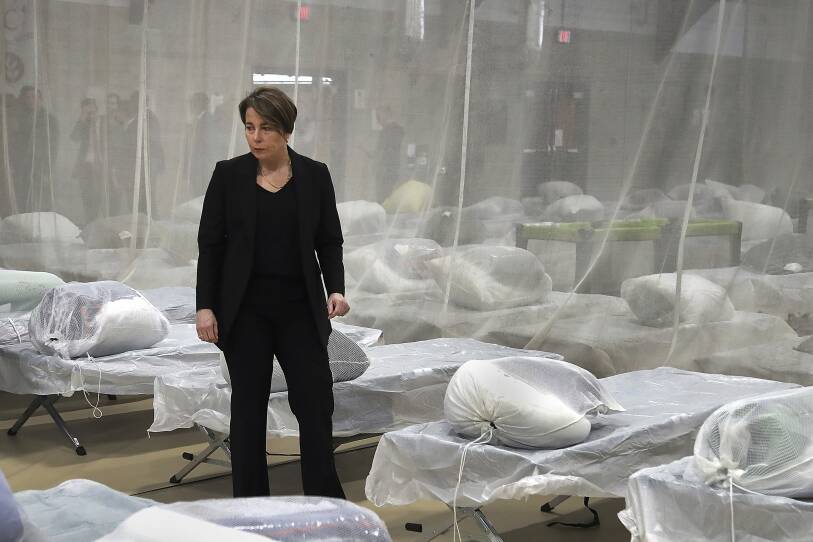As state and local officials grapple with supporting migrant families in more official settings like the state emergency shelter system and overflow sites, they’re also leaning on faith groups and residents to lend a helping hand.
On Wednesday during a press conference launching a shelter site at the Melnea Cass Recreation Center in Roxbury, Gov. Maura Healey thanked faith leaders for finding additional shelter spaces and providing programming, calling it a “village effort.”
Church leaders and groups are encouraging more people to join that village effort as migrant families continue to arrive in Massachusetts needing help — and those who have been offering aid for the past many months are feeling stretched.
“We want to make sure the same communities aren’t over tapped again and again and again,” the Rev. Laura Everett, executive director of the Massachusetts Council of Churches, said during a meeting of faith groups on Thursday. “We are connecting with some churches in highly economically resourced areas and giving them fully opportunity to give out of their wealth and out of their volunteer opportunities.”
Residents can also help, from small actions like driving new arrivals around town or language tutoring to bigger commitments like hosting families in need of shelter. She’s asking that interested people sign up for volunteering on their website, or reach out to the Immigrant Family Services Institute a Mattapan-based organization that has helped thousands of Haitian migrants.
“We’re especially hopeful that people who are bilingual in Spanish or Haitian Creole might be able to step forward,” said Everett.
People with a driver’s license who are willing to transport immigrant families are also needed.

Melrose-based Immigrant Support Alliance, an all-volunteer group, is so small it can only help a couple of people at a time. But the group has been supporting asylum seekers for years and, as a result, knows exactly what new arrivals need.
“We try to provide housing through host homes and provide other services like transportation, English-language tutoring, help with resumes and job searches, medical — you know, all the things that a new arrival needs to navigate,” said Paul Belfanti, the group’s president.
Once people get their work permits and save funds to stabilize themselves, assistance from the group winds down.
In January, Immigrant Support Alliance held a public meeting about how to host a new arrival. The group set expectations for a three-month minimum commitment, explained background checks, and brought former hosts to talk to interested people.
During past international conflicts, they’ve had success connecting new arrivals with local residents, with Belfanti describing a six-person family from Uganda being hosted for a few months.
But he recognizes some people might want to help but can’t commit to hosting. The group has a broad network of volunteers who help with different types of things, even navigating registration for a local school district.
“They just want to sign up and say, ‘Hey, I could help somebody with financial literacy’ or ‘I’ll take somebody to a food bank,’” he said.
The state said it also has a list of organizations residents can call to see how they can support.
“I don't know that I ever will fully grasp what the experience of journeying to the U.S. [is like] ... and, therefore, how powerful any small act of kindness is after that experience.”The Rev. Katie Cole, interim pastor at Hartford Street Presbyterian Church in Natick
Some churches are offering spaces for immigrant families to stay during the day, or shelter overnight.
“We have churches that are allowing folks to use their kitchen. Right? If you’re staying in a hotel or you’re staying in one of these larger shelters, you don’t get to cook your own food. But, boy, do you miss the tastes of home,” said Everett.
One of those churches is Episcopal Church of Our Saviour in Milton. They’ve partnered with the Immigrant Family Services Institute to serve up to 30 people daily.
“[We] opened our doors to welcome migrant families during the day,” said the Rev. Rachael Pettengill-Rasure. “IFSI brings them over to the church in the morning and they spend time at the church. The children play, the adults cook lunch, and they rest.”
Hartford Street Presbyterian Church in Natick has
housed a few families
overnight since last June, with congregants supporting migrants living there.
The Rev. Katie Cole, interim pastor there, described what she’s learned through helping new arrivals.
“I don’t know that I ever will fully grasp what the experience of journeying to the U.S. [is like], and the path that so many of these families have taken,” she said. “Like how incredibly harsh that journey is and, therefore, how powerful any small act of kindness is, after that experience.”








